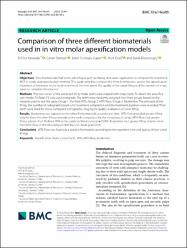Comparison of three different biomaterials used in in vitro molar apexification models
Citation
Kalaoglu, E. E., Duman, C., Capan, B. S., Ocak, M., & Bilecenoglu, B. (2023). Comparison of three different biomaterials used in in vitro molar apexification models. BMC oral health, 23(1), 434. https://doi.org/10.1186/s12903-023-03180-yAbstract
AmaçlarYeni biyomateryallerin, tek adımlı apeksifikasyon yönteminde geleneksel MTA'ya göre karıştırılması ve daha kolay uygulanması gibi bazı avantajları vardı. Bu çalışma, olgunlaşmamış azı dişlerinin apeksifikasyon tedavisinde kullanılan üç biyomateryali, harcanan süre, kanal dolgusunun kalitesi ve işlemi tamamlamak için çekilen röntgen sayısı açısından karşılaştırmayı amaçladı.YöntemlerÇıkartılan otuz dişin kök kanalları Azı dişleri döner aletlerle şekillendirildi. Apeksifikasyon modelini elde etmek için retrograd ProTaper F3 kullanıldı. Dişler, apeksi kapatmak için kullanılan malzemeye göre rastgele üç gruba ayrıldı; Grup 1: Pro Root MTA, Grup 2: MTA Flow, Grup 3: Biodentine. Dolgu miktarları, tedavi tamamlanana kadar çekilen radyografi sayısı ve tedavi süresi kaydedildi. Daha sonra kanal dolgusunun kalitesinin değerlendirilmesi amacıyla mikro bilgisayarlı tomografi görüntüleme için dişler tespit edildi.SonuçlarBiodentine'in zamana göre diğer dolgu malzemelerine göre üstün olduğu görüldü. MTA Flow, meziobukkal kanallar için sıralama karşılaştırmasında diğer dolgu malzemelerine göre daha fazla dolum hacmi sağladı. MTA Flow, palatinal/distal kanallarda ProRoot MTA'ya göre daha yüksek dolum hacmine sahipti (p = 0,039). Biodentine, meziolingual/distobukkal kanallarda MTA Flow'dan daha fazla dolum hacmine sahipti (p = 0,049).SonuçlarMTA Flow, tedavi süresi ve kök kanal dolgularının kalitesine göre uygun bir biyomateryal olarak bulundu. ObjectivesNew biomaterials had some advantages such as mixing and easier application as compared to traditional MTA in single step apexification method. This study aimed to compare the three biomaterials used in the apexification treatment of immature molar teeth in terms of the time spent, the quality of the canal filling and the number of x-rays taken to complete the process.MethodsThe root canals of the extracted thirty molar teeth were shaped with rotary tools. To obtain the apexification model, ProTaper F3 was used retrograde. The teeth were randomly assigned into three groups based on the material used to seal the apex; Group 1: Pro Root MTA, Group 2: MTA Flow, Group 3: Biodentine. The amounts of the filling, the number of radiographs taken until treatment completion and the treatment duration were recorded. Then teeth were fixed for micro computed tomography imaging for quality evaluation of canal filling.ResultsBiodentine was superior to the other filling materials according to time. MTA Flow provided greater filling volume than the other filling materials in the rank comparison for the mesiobuccal canals. MTA Flow had greater filling volume than ProRoot MTA in the palatinal/distal canals(p = 0.039). Biodentine had greater filling volume more than MTA Flow in the mesiolingual/distobuccal canals (p = 0.049).ConclusionsMTA Flow was found as a suitable biomaterial according to the treatment time and quality of root canal fillings.

















